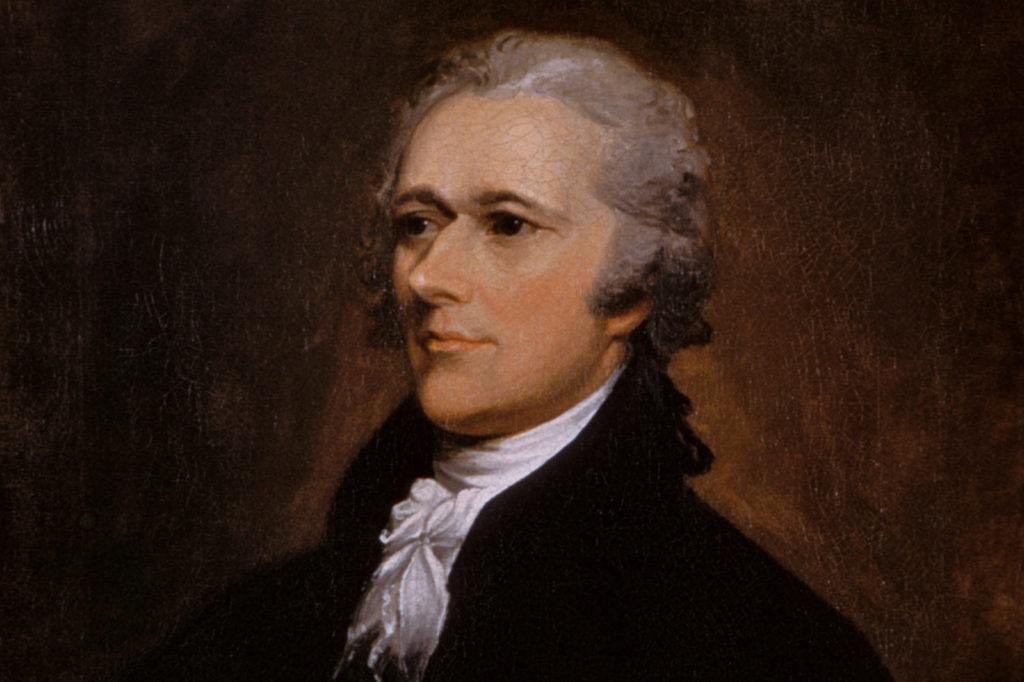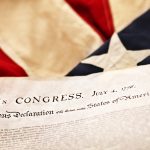Carson Holloway and Bradford P. Wilson are among America’s preeminent scholars of the life and thought of Alexander Hamilton. Like many others, I have benefited from their contributions to Hamilton scholarship, especially their edited two-volume The Political Writings of Alexander Hamilton.
That is why one is bound to read carefully their recent critique of my Public Discourse essay “Alexander Hamilton and American Nationalism, in His Time and Ours.” In that essay I suggest that Hamilton’s brand of nationalism differs significantly from the dominant forms of nationalism that have assumed a central place in American politics since 2015. Holloway and Wilson argue that my analysis goes “astray partly by overlooking some relevant aspects of Hamilton’s thought, and partly by implicitly mischaracterizing today’s American nationalism.” I welcome the opportunity to reply to their three primary criticisms.
Nationalism and Universalism
In response to my claim that Hamilton’s nationalism emphasized universal norms far more than most contemporary American nationalists, Holloway and Wilson argue that emblematic figures of the new nationalism, such as Senator Marco Rubio and President Donald Trump, have not abandoned these principles. Their rhetoric, Holloway and Wilson maintain, embraces norms of liberty and justice. They argue that today’s nationalists are primarily correcting for insufficient attention given in recent decades to America’s well-being as a nation.
Start your day with Public Discourse
Sign up and get our daily essays sent straight to your inbox.Holloway and Wilson are correct that many contemporary American nationalists have not given up on the language of liberty and justice. It is also true that the embrace of globalist-borderless world rhetoric by most of the left and some on the right did diminish attention to America’s distinctiveness as a country. Nevertheless, I would maintain that references to wider universal values by many contemporary American nationalists are sparse compared to what we find in Hamilton’s writings and addresses.
I see, for instance, few Hamilton-like invocations of natural law in the language of most contemporary nationalists. Some of national conservatism’s most articulate exponents entertain more than a few doubts about the import of natural law discourse and are skeptical about what they call “Enlightenment rationalism,” despite its undeniable saliency for the American Founding.
Some of national conservatism’s most articulate exponents entertain more than a few doubts about the import of natural law discourse and are skeptical about what they call 'Enlightenment rationalism,' despite its undeniable saliency for the American Founding.
Some new nationalists have highlighted the role of the Hebrew and Christian Scriptures in shaping American identity. That is a welcome corrective to those who have caricatured the Founding primarily as the work of skeptics and Deists. But many of the same nationalists downplay other important universal sources that influenced the Founding. These include the deep attachment to classical Greek and Roman figures and thought, notions of republican virtue, specific French Enlightenment thinkers like Montesquieu, Northern European Protestant commentators, and various Scottish Enlightenment sages.
All these reference points were part of the cross-national republic of letters that shaped the outlook of educated individuals in eighteenth-century northern Europe and North America. They were central not only to the way that individuals like Hamilton, George Washington and John Adams understood the world but also to how they envisaged America’s character as a nation.
The dearth of attention to these sources in many of the new nationalists’ commentaries, such as those published in the new nationalism’s leading journal American Affairs, is telling. Instead of discussion of the principles and ideas that shaped the Founding and what they mean for American identity, one is more likely to find articles praising Chinese corporatism, or explaining what we need to learn from Hegel, or suggesting that the administrative state created by progressives and modern liberals can be used to realize integralist goals. This is very distant from Hamilton’s intellectual universe.
The People and Natural Aristocrats
Holloway and Wilson’s second criticism touches on the issue of the popular will. They hold that I go “too far in claiming that ‘America’s greatness depended little, in Hamilton’s estimation, on whether it followed popular sentiment.’”
In The Federalist, Holloway and Wilson note, Hamilton stressed that republican self-government involves resisting every passing popular whim. Holloway and Wilson, however, then contend that Hamilton “acknowledged in this same context that, the ‘republican principle demands that the deliberate sense of the community should govern those to whom they entrust the management of their affairs.’” Many who embrace populist priorities today, they propose, are arguing for something similar against those political leaders who have ignored rising dissatisfaction with trade and foreign policy.
In my view, this accurately describes a significant dynamic presently driving American politics. Yet I also think Holloway and Wilson overplay the extent to which Hamilton thought the sense of the community should prevail.
It wasn’t for idle reasons that Hamilton used the word “deliberate” in the section quoted by Holloway and Watson from Federalist no. 71. The word implies thoughtful consideration, reasoned discussion, and careful consideration of all possible options before making a decision.
Hamilton didn’t doubt that “the people intend the public good.” Nonetheless he extensively details the negative pressures to which their deliberation about political issues is subject. The people, Hamilton argues, are endlessly plagued “by the wiles of parasites and sycophants; by the snares of the ambitious, the avaricious, the desperate; by the artifices of men who possess their confidence more than they deserve it; and of those who seek to possess, rather than deserve it.” The people consequently needed guidance—perhaps of a quite direct nature—from those experienced in public affairs.
Hamilton was not naïve about elites. Credentials and pedigree, he knew, were no more a guarantee of wisdom, probity, and genuine learning in his time than ours. Hamilton’s years in New York and federal politics deepened his consciousness that a country’s leaders were as potentially weak and corrupt as everyone else. But Hamilton was adamant that American constitutionalism’s sound functioning depended upon there being enough extraordinary individuals in public life with the character to prevent the people from confusing, he comments in Federalist no. 71, their true interests with “their inclinations.”
In the same paragraph, Hamilton refers to such figures as “the guardians of these interests,” “who had courage and magnanimity enough to serve [the people] at the peril of their displeasure.” Hamilton likely had in mind leaders like Washington, or his own willingness to undertake deeply unpopular tasks like defending Tories’ property rights in court after the Revolutionary War. While such personalities are extremely rare, Hamilton saw them as indispensable.
All this indicates that Hamilton was less optimistic about the extent to which the people could engage in careful deliberation than Holloway and Wilson appear to suggest. Though his darker view of human nature would have surely inclined him against the idea of philosopher-kings, Hamilton plainly believed that those who might be called “natural aristocrats” were essential for the new republic. That may sound awfully elitist to our ears today. But I don’t think there is much question that Hamilton thought this way.
The Economics of American Nationalism
Holloway and Wilson’s third critique concerns my contention that Hamilton was more favorable to economic liberty and markets than today’s nationalists. According to Holloway and Wilson, “today’s economic nationalists are, like Hamilton, generally defenders of markets and economic liberty.” But they maintain that people such as Senator Rubio and President Trump also share Hamilton’s concern with balancing commitments to economic freedom with greater attention to geopolitical realties. These realities include the perpetual possibility of war and America’s subsequent need to maintain adequate self-sufficiency, as well as the necessity to address contemporary challenges posed by states like an increasingly aggressive China.
Of the three critiques offered by Holloway and Wilson, I find this the weakest. Most economic liberals from Adam Smith onwards have always maintained that national security constitutes a legitimate exception to free trade. Hamilton’s belief in America’s need to develop military self-sufficiency was consistent with Smith’s strictures in Book V of his Wealth of Nations concerning the government’s role vis-à-vis defense and his willingness to support decidedly non-market policies like Britain’s Navigation Acts.
More significantly, the size and scale of economic interventions proposed by many of today’s nationalists dwarfs the scope of measures advocated in Hamilton’s Report on the Subject of Manufacturers. In the name of resisting what they call “market fundamentalism,” some contemporary economic nationalists speak of establishing a new “consensus that emphasizes the importance of family, community, and industry to the nation’s liberty and prosperity.” They also underline the need to reorient policy away “from growth for its own sake to widely shared economic development that sustains vital social institutions,” and stress the importance of “setting a course for a country in which families can achieve self-sufficiency, contribute productively to their communities, and prepare the next generation for the same.”
Others want the government to universalize “welfare capitalism” “by mandating the provision by employers of health insurance, paid parental leave, paid vacations and other benefits, with transitional subsidies to help small businesses adapt.” Then there is the insistence that America must reindustrialize the economy (despite all the evidence indicating that America’s alleged deindustrialization is a myth).
Holloway and Wilson rightly observe that we can’t really know what Hamilton would have made of all this. What can be said is that the breadth and depth of these and other proposals would result in even more of America’s already extensively regulated economy being handed over to direction by government officials on a scale that easily surpasses the parameters of Hamiltonian political economy. Such measures would also create even more opportunities for the type of political and business cronyism that Hamilton detested.
Many of today’s nationalists put far more faith in experts using state power, industrial policy, and regulations at the macro and micro-level than they do in free enterprise and exchange. Their economic thought is more akin to that of modern liberalism and the managerial state than the dynamic commercial republic envisaged by Hamilton.
Hamilton was not an economic libertarian. He advocated energetic government and insisted on viewing economic questions in the context of international and domestic politics. But the vision of today’s nationalists for America’s economy sits very uneasily with Hamilton’s decided preference for markets and his deep respect for the spirit of enterprise and commercial liberties more generally. Many of today’s nationalists put far more faith in experts using state power, industrial policy, and regulations at the macro and micro-level than they do in free enterprise and exchange. Their economic thought is more akin to that of modern liberalism and the managerial state than the dynamic commercial republic envisaged by Hamilton.
Idealism and Realism
Holloway, Wilson, and I agree far more about Hamilton’s thought than we disagree. Our differences lie in the realm of emphases as well as our assessment of today’s American nationalism. The bigger question is why Hamilton’s place in these contemporary discussions looms so large 216 years after his death in a duel with a sitting Vice-President of the United States.
I think it is because Hamilton was that rare commodity: a thinker and a man of action. He reflected at length upon the kaleidoscope of ideas that animated the American Founding. But Hamilton was also a political leader: one who insisted that any effort to actualize these ideas must be attentive to realities like human imperfectibility and the fact that we live in a world in which nations tend to pursue their self-interest.
In short, Hamilton integrated a commitment to ideas that transcended national boundaries with realism about human nature, a nation-focused patriotism, and attention to the circumstances in which America found itself. At the best of times, that particular combination is difficult to hold together. It is, however, fundamental to the spirit and longevity of America, both as an experiment in ideas and as a distinct sovereign state. That is why Hamilton’s thought and deeds remain a standard of evaluation for those who care about preserving the genius of that experiment and the greatness of that nation today.













